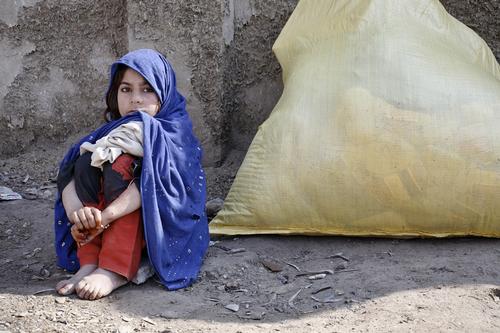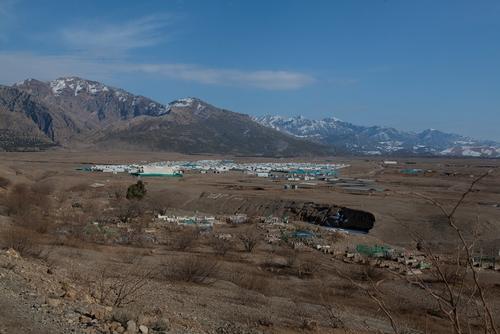They are poor, destitute refugees or have been displaced by fighting in their region of origin. They are secretaries, doctors or nurses. Patients and team members of Médecins Sans Frontières (MSF) in Peshawar and Hangu describe the challenge of childbirth in Pakistan, which has one of the highest maternal mortality rates in the world.
"I'm a gynaecologist at the Peshawar Women's Hospital set up by MSF. Here, we specialise in emergency obstetrics to provide the most vulnerable women a safe place to give birth to their baby," says Dr Kanako Ishii. The Women's Hospital opened its doors in 2011. Peshawar is the capital of the province of Khyber Pakhtunkwa (KPK) in the northwest of the country. More than three million people live here and Peshawar is far from being a medical desert. Clinics, hospitals, pharmacies and caregivers are expected to meet the medical needs of the entire population. Yet many women are deprived of maternal care.
"I started coming here six months ago. My baby was born the day before yesterday" said a patient, native to the tribal areas. "In fact, I first went to another hospital because of my bleeding, but the doctor told me that I needed two injections to prevent the baby from being born with disorders. When I told him I did not have the money to pay for this, he gave me the address of this hospital. My baby was born by caesarean section and I 'm lucky to hold a healthy child in my arms today. "
"A caesarean costs about 10,000 rupees in a public hospital and up to 60,000 in a private clinic. Even a normal delivery costs 5,000 rupees in a public hospital and 20,000 in a private clinic. It is very expensive for the poorest women” laments Dr Nageen Naseer, MSF doctor in Peshawar. Too expensive, too far, these treatments are inaccessible to the most vulnerable, particularly to those families displaced by fighting and violence in the border areas with neighboring Afghanistan. "Displaced people and refugees represent approximately 10% of our patients and it is increasing" said Salma, responsible for the reception and registration of patients upon arrival at the hospital.
A caesarean costs about 10,000 rupees in a public hospital and up to 60,000 in a private clinic. Even a normal delivery costs 5,000 rupees in a public hospital and 20,000 in a private clinic. It is very expensive for the poorest women.Dr Nageen Naseer, MSF doctor in Peshawar
But cost is not the only obstacle to accessing maternal health care. Very rooted in family traditions, home birth by natural means is seen as the only honorable way for a mother to give birth, regardless of the consequences for her or the newborn. Thus, women face particularly strong resistance from their husbands or their stepmothers before being allowed to go to the hospital. "If this decision to break the traditional rule" is taken, it is not only because the relatives of the mother are ready to do so, but also because the health center is accessible and has some acknowledgment from the community," says Mathilde Berthelot, head of MSF programmes in Pakistan. As illustrated by this testimony of a patient hospitalised in Peshawar hospital’s intensive care unit: "I asked the taxi driver to lead me to the "women's hospital" and he brought me here. All the women in my village come here when they are pregnant because we know that the doctors are doing everything to avoid caesarean section."
Seeking treatment or work in a health care facility operated by a foreign organization like MSF is another challenge for patients and employees. "At first my family was worried about security issues. They thought that by working with foreigners I could be attacked or kidnapped, "recalls Dr Naseer who joined MSF in November 2012, "but I feel completely safe here and I have no problem taking the night shift." Salma's family was afraid that her behaviour might change because she was working with foreigners, "but I have not changed at all. I still wear the same clothes and do shopping with my family as always. I think they understand now."
Beyond the choice to give birth at home or in a hospital run by foreigners, the willingness to give birth very quickly is a specific request in Pakistan that often causes rapid deterioration of the status of mothers and babies. "Here women and their families want a fast induced delivery. Several times a day, I am asked to accelerate labour while natural contractions are already strong, regular and efficient. If we do not administer this medication because it does not meet appropriate therapeutic needs, patients leave and come back a few hours later having ingested high doses of stimulants. They then show up in a very critical condition, with severe bleeding, uterine rupture, blocked labour and sometimes foetal death," says Jessica Holden, gynaecologist working in Hangu.
Isolation, insecurity, poverty and traditional beliefs are obstacles to be overcome by Pakistani women in order to receive high-quality maternal care and give birth without risking their lives and those of their children.
Since 1986, MSF has been working in Pakistan with Pakistani communities and Afghan refugees who are victims of armed conflict and natural disasters, or who lack access to medical care. MSF teams are currently providing free emergency medical care in Kurram and Bajaur Agency (FATA), Khyber Pakhtunkhwa, Sindh and Balochistan provinces. MSF relies solely on private financial contributions from individuals around the world and does not accept funding from any government, donor agency or military or politically-affiliated group for its activities in Pakistan.




